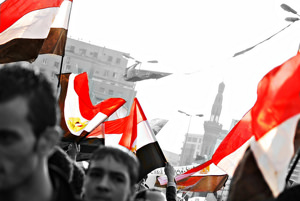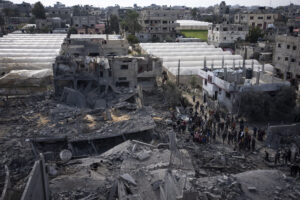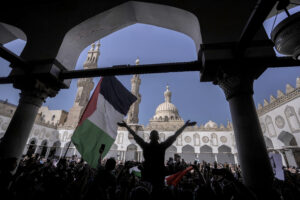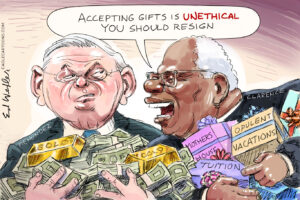Dispatches From Cairo: Blood, Youth and Revolution
The rough mobilization and confrontation that have occurred at every juncture in Egypt's post-revolutionary evolution is happening again as the first true presidential election in the nation's long history approaches.
We asked Lauren Unger-Geoffroy, an international artist who lives in Cairo, to share her perspective of life in Egypt after the revolution. In this entry, she writes about the outbreak of new violence and the fervor of young revolutionaries.
Youth is a branch of insanity. —Prophet Muhammad
CAIRO — “I have a gun.”
Yussef, 20, told me this excitedly on the phone Wednesday. He was calling from a protest in Cairo’s Abbasseya district, near the Ministry of Defense, and I could barely hear him over the yelling and chaotic noise in the background.
Earlier, his mother had stopped me in front of the new Muslim Brotherhood election information tent when our paths crossed in my largely MB-hostile Salafi neighborhood. Uma Yussef (“Mother of Yussef” — some Arabs take as their name “mother of” or “father of” their eldest son) was nearly hysterical because she had heard of people being killed at protests and then was unable to contact Yussef, who has a habit of ignoring her calls to his cellphone. She knew he would answer a call from me, and she asked me to phone him to see if he was all right. “Tell him to come home!” she pleaded. “Stupid, stupid boy!” Soon I was speaking with him.
“Why do you have a gun?”
“What?”
“Why?” I shouted.
“They have guns! It is war! A guy here is killed! I have to go!”
“Yussef, be careful!”
And he was off.
Reasoning with him had been out of the question. He was racing on adrenaline and looking forward to tasting blood, his or someone else’s, to confirm his proud revolutionary heroism.
The rough mobilization and confrontation that have occurred at every juncture in Egypt’s post-revolutionary evolution is happening again as the first true presidential election in the nation’s long history approaches.
Twenty people have been reported dead, and hundreds more injured, in what is now labeled a massacre — more than three days of shootings and stabbings. Knives, guns, metal rods, bludgeons, tear gas, rocks are the usual weapons in these now familiar street battles.
It is no surprise that the aggressors were “unidentified thugs,” assumed to be employed by the deposed regime and/or the Supreme Council of the Armed Forces (SCAF). The locals of various neighborhoods were, at least at first, allies against the protesters, who became more destructive after initially peaceful demonstrations were attacked. Stores, homes and buses burned as the injured were rushed on scooters to field clinics in a now depressingly familiar scenario.
The army was two days slow to intervene. Some Egyptians said the military was letting the “thugs” do its dirty work. But to what end? If the military is indeed supporting this violence, what exactly is its motivation? The bloodletting has once again united the opposition against the SCAF’s military rule as revolutionaries from all parties have rushed into the fray.
The latest round of demonstrations began Saturday in the mostly pro-SCAF neighborhood of Abbasseya as crowds made up primarily of supporters of Salafist preacher Hazem Abu Ismail protested the disqualification of the front-running presidential candidate. Abu Ismail, a fundamentalist hard-liner, was forced out of the race because his late mother had held American citizenship, in violation of a candidacy rule originally pushed through by the Salafi Party itself. (Abu Ismail’s followers, never ones to reply on evidence, insist that the disqualification was based on a lie.) Soon stones flew, and guns, some handmade, did their deadly work.
Violence has so often been used to distract public attention from covert missions of the true powers here that the people understandably suspect that the government’s hand is now at work. They can’t believe the coming vote will not be fixed — as “elections” were in the past — or delayed until the SCAF’s hidden agenda has been implemented.
Though the SCAF previously was committed to ceding power to the new president by June 30, after a free and fair election, Gen. Sami Annan, the SCAF’s deputy head, said recently that the military “might possibly” hand over power after this month’s first round of elections if a candidate won outright with more 50 percent of the vote. With 13 candidates, that is numerically next to impossible. Several have dropped out in protest against the new stand by the SCAF. [Editor’s note: At a Thursday news conference, Gen. Adel Aasar, a member of the SCAF, said the military would transfer authority to a new president by June 30. “We are not seeking power. SCAF is not a substitute for legitimate authority,” he said.]
Whatever the deepest cause of the new violence, suddenly the people have forgotten the recent and smoldering antagonism against Saudi Arabia.
The Jewish Star of David that a demonstrator drew on the front of the Saudi Embassy has been erased after the outraged departure from Cairo of the Saudi ambassador. Demonstrations outside the embassy were aimed at the allegedly unwarranted imprisonment of an Egyptian lawyer in Saudi Arabia. The Saudi ambassador had said in February that 1,400 Egyptians were in Saudi jails. Longstanding resentments boiled to the surface, and hostile media reports, jokes and cartoons appeared on both sides. Saudi economic experts warned of the repercussions of the political crisis between Egypt and Saudi Arabia, where about 1 million Egyptians work. Experts estimate that Saudis hold more than $12 billion in investments in Egypt.
Even though it withdrew its ambassador Saturday in reaction to the demonstrations, and later closed its Cairo embassy, Saudi Arabia later said it would proceed with its plan to give Egypt $2.7 billion in aid.
As usual in Egypt in times of unrest, absurd propaganda churns in the background. An example of such hooey is the rumor that Islamists are trying to implement a “right to necrophilia with wives,” a story picked up by websites including those of some international media companies.
Meanwhile, the fundamentalist Salafis have now surprisingly thrown their support behind the ex-Muslim Brotherhood Islamist Liberal candidate Abdel-Moneim Abul-Fotouh, who is also backed by none other than Wael Ghonem, the great hero and facilitator of the revolution. It is now a clear contest among the three major candidates: Abul-Fotouh; the secularist Amr Moussa, ex-chair of the Arab League and Egyptian foreign affairs minister; and Mohamed Mursi of the Muslim Brotherhood’s Freedom and Justice Party, who will have to work hard to regain the MB’s diminished voter base. The reinstatement of the previously disqualified SCAF candidate, Ahmed Shafiq — a former general who is friendly to the United States and Israel and who briefly was the last prime minister of the Mubarak government — raised a small outcry, but his was never a popular nomination, and quickly other outrages took precedent.
* * *
Dima Shawky’s brother was injured at Saturday’s demonstration at the Saudi Embassy. She told me this with a blend of pride and envy after I encountered the march in which she and others headed toward the demonstration at the Ministry of Defense on Sunday. Her eye makeup was perfect under the thick layers of her black niqab, and her small frame and high-pitched adolescent voice challenged her claim that she had been a revolutionary for years. She told me she was 19 and of course would be voting in the presidential elections. I nodded to her clothing and asked her if she was Salafi, and she responded fiercely: “I am a revolutionary. I have always been a revolutionary and I will always be. The people of the street should control the country. That is democracy.”
So what are you protesting today?
“I am protesting the military government. They must go out!” She said this loudly, and other people in the march turned and seconded her words.
“Aren’t most people here protesting Abu Ismail’s disqualification for candidacy?” I indicated the bearded and sign-bearing people gathering on the route. “I mean, … his whole family are U.S. citizens and live in California, and that was the rule the Salafis wrote.”
“I don’t care,” she said. “I am here as a revolutionary to support the revolution, whatever the subject.” She was adamantly in agreement with the anger about the reinstatement of the candidacy of Shafiq, a remnant of Hosni Mubabrak’s regime. “They are trying to steal back the revolution but we won’t let them! … They are murderers and liars.”
She didn’t once say the name of Allah, a common invocation among conservative Egyptians. That seemed to clash with her wearing of a niqab. I felt compelled to ask: “If the government forced you to wear the niqab, would you, in the name of revolution, violate the order and take it off? If Egypt became like Saudi [in requiring the niqab] …?”
She deflected my question, saying: “I protested against the Saudi Embassy yesterday. They are keeping thousands of Egyptians in prison without trial. They only have oil, they are hypocrites. We don’t want them.”
“What do your parents say?”
“They understand I am a revolutionary, but of course they are worried.”
“Do they know you are here?”
She looked mischievous and said, “Not exactly.”
And then two of her friends — girls in niqab and waving Egyptian flags — passed, and she joined them in chanting, “Out! Out! The military government!”
Covered in cloth as they were, I imagined their parents would not have been able to recognize them in photos of the march.
I hope the three teenagers went home before violence broke out. I hope that they — and Yussef, whom I have not been able to reach since Wednesday — are back with their families, and away from harm.
I didn’t get a chance to talk about other issues with Dima Shawky, and she didn’t mention the breaking of the fuel deal with Israel, or the Islamists’ global endorsement of Abul-Fotouh Abou-Fotouh. But I guess it doesn’t matter. She is for the revolution of the street, whatever it may be. The new Egypt will be hers.
Your support matters…Independent journalism is under threat and overshadowed by heavily funded mainstream media.
You can help level the playing field. Become a member.
Your tax-deductible contribution keeps us digging beneath the headlines to give you thought-provoking, investigative reporting and analysis that unearths what's really happening- without compromise.
Give today to support our courageous, independent journalists.






You need to be a supporter to comment.
There are currently no responses to this article.
Be the first to respond.